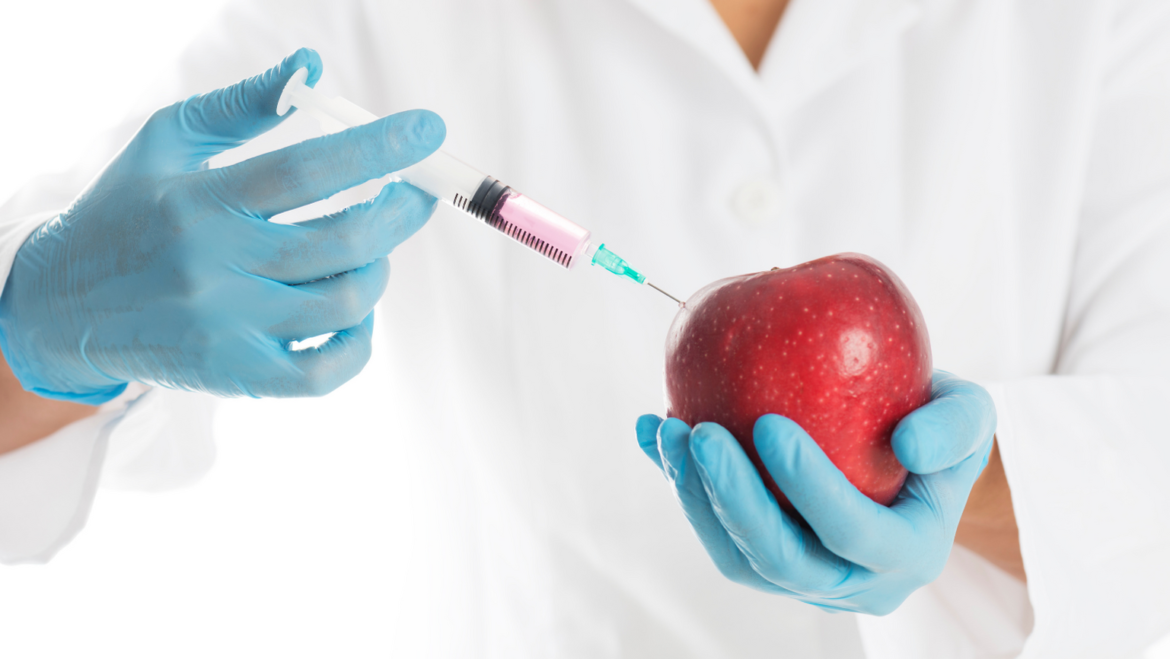By Carole Griggs, PhD
It seemed appropriate to write an informational article about genetically modified foods (GMO’s – genetically modified organisms, biotech foods), since California’s Prop 37 was actually voted down in the November 2013 elections. If this prop had passed, California would have been the first state in the nation to require labeling on all processed foods and genetically engineered crops, educating consumers of the foods that have been genetically altered.
Genetically modified foods have not been shown to be safe to consume. Yikes! It is quite an interesting way of integrating foreign genetic material from viruses and bacteria into crops, with consequences that are very unpredictable. Big biotech firms are pushing GM foods, and yet most consumers are unaware of the incredible history of toxic contamination that is involved with this process. “US government data show that the U.S. GM crops have produced an overall increase, not decrease, in pesticide use compared to conventional crops.” 1 This is frightening information.
Genetically modified plants present various dangers. The process of genetic engineering itself creates unpredicted alterations. Although FDA scientists evaluating GMO’s were unaware of the extent to which GM DNA is damaged or changed, they too described the potential consequences. They reported, “The possibility of unexpected, accidental changes in genetically engineered plants” might produce “unexpected high concentrations of plant toxicants.” GM crops, they said, might have “increased levels of naturally occurring toxins,” and the “appearance of new, not previously identified” toxins. 2 Immune reactions, allergies, liver damage, reproductive failure, and infant mortality, are just a few issues under investigation related to GMO’s. This is not good.
Nation of Change Journal put together the “Top 10 Worst GMO Foods for Your GMO Foods List. “ Let’s take a look:
1. Corn: This is a no-brainer. If you’ve watched any food documentary, you know corn is highly modified. “As many as half of all U.S. farms growing corn for Monsanto are using genetically modified corn,” and much of it is intended for human consumption. Monsanto’s GMO corn has been tied to numerous health issues, including weight gain and organ disruption.
2. Soy: Found in tofu, vegetarian products, soybean oil, soy flour, and numerous other products, soy is also modified to resist herbicides. As of now, biotech giant Monsanto still has a tight grasp on the soybean market, with approximately 90 percent of soy being genetically engineered to resist Monsanto’s herbicide Roundup. In one single year, 2006, 96.7 million pounds of glyphosate was sprayed on soybeans alone
3. Sugar: According to NaturalNews, genetically-modified sugar beets were introduced to theU.S. market in 2009. Like others, they’ve been modified by Monsanto to resist herbicides. Monsanto has even had USDA and court-related issues with the planting of its sugar beets, being ordered to remove seeds from the soil due to illegal approval.
4. Aspartame: Aspartame is a toxic additive used in numerous food products, and should be avoided for numerous reasons, including the fact that it is created with genetically modified bacteria.
5. Papayas: This one may come as a surprise to all of you tropical-fruit lovers. GMO papayas have been grown in Hawaii for consumption since 1999. Though they can’t be sold to countries in the European Union, they are welcome with open arms in the U.S. and Canada.
6. Canola: One of the most chemically altered foods in the U.S. diet, canola oil is obtained from rapeseed through a series of chemical actions.
7. Cotton: Found in cotton oil, cotton originating in India and China in particular has serious risks.
8. Dairy: Your dairy products contain growth hormones, with as many as one-fifth of all dairy cows in America are pumped with these hormones. In fact, Monsanto’s health-hazardous rBGH has been banned in 27 countries, but is still in most US cows. If you must drink milk, buy organic.
9. and 10. Zucchini and Yellow Squash: Closely related, these two squash varieties are modified to resist viruses.
With little regulation and safety tests performed by the companies doing the genetic modifications themselves, we have no way of knowing for certain what risks these lab-created foods pose to us outside of what we already know.
The best advice: steer clear of them altogether.
1. Impacts of Genetically Engineered Crops on Pesticide Use: The First Thirteen Years. Charles Benbrook, Ph.D., The Organic Center, November 2009, http://www.organic-center. org/science.pest.php?action=view&report_id=159
2 Edwin J. Mathews, Ph.D., in a memorandum to the Toxicology Section of the Biotechnology Working Group. Subject: Analysis of the Major Plant Toxicants. Dated October 28, 1991

